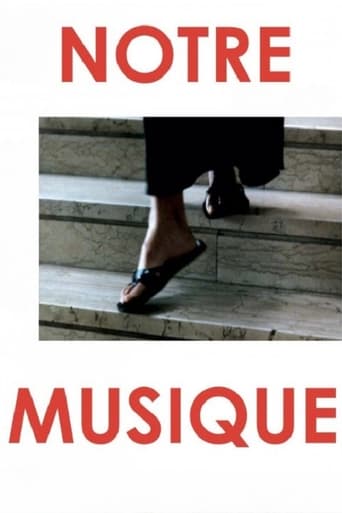

Jean-Luc Godard's quasi-update of Dante's Divine Comedy set to the modern world. The first segment of the film is hell and it only runs at about 10 minutes. In it, Godard has cobbled together a devastating montage of scenes of human destruction from the holocaust, Vietnam, the American Civil War, and other scenes of warfare and destruction, all compiled from documentary and movie footage. It's an impressive sequence as he overlaps the scenes of horror over the sounds of a melodic piano score. Then the film moves into limbo, the section usually regarded as the least interesting of Dante's cantos. Godard spends the bulk of his time on this section. In it, a French Jewish journalist attends a literary conference and meets Godard as himself and meets the Palestinian poet Mohmoud Darwish and discuss the Israeli-Palestinian conflict. She travels to Sarejevo and witnesses the aftermath of Serbian destruction (a topic which Godard is clearly haunted with), and includes some direct views on cinema from Godard himself. The final section is in paradise. It features perplexing images with the protagonist in a beautiful forest guarded by American soldiers. Notre Musique is about the state of the world at the beginning of the 21st century. It is a powerful and esoteric rumination of the art and history of the past, and a foreboding insight into what the future may look like. The film includes a wonderful piano score from Sibelius and Tchaikovsky and beautiful color photography from Julien Hirsh. The film was shot in 1:33 aspect ratio so don't expect the DVD to appear in scope.
... View MoreThere are movies to help you relax on a Saturday night and there are movies that stimulate, even if that means asking questions that have no answers. I didn't understand this movie but I still felt stimulated by its questions. I tried so hard to make the connections and I had a lot of trouble. But you don't read Portrait of the Artist as a Young Man once without discussing it and expect to understand it. Nor is the more accessible Three Colors Trilogy meant to be seen only once for complete understanding. The quality of a movie is not determined by its accessibility. It's a limited understanding of the medium to judge film by its accessibility. It can be more than an easy way to relax. It can be the impetus to dialogue. I cared about this movie because I didn't understand it.
... View More"Our Music" is the result of a working man, a man that has been investigating sound and image for so many movies. As time goes by, Godard's images are simpler, but his editing has become tremendously complex.The film rests over Dante's "Divine Comedy": Hell, Purgatory and Paradise. Hell is a montage of war stock material. Purgatory is Sarajevo today and Paradise is plain nature guarded by U.S. Marines. As usual, many of the dialogs are made up of quotes and the author is rarely quoted, because through the editing the made-up phrases become humanity's questioning.By playing with the World's sounds and images, deconstructing time and space, the poetry comes naturally, not forced at all. Godard looks at todays technified world from a distance, mixing things and themes to see what happens, to bring up new possibilities and questions.As usual happens with this French filmmaker, the sound design is astonishing.If you like the work of Godard, you will love this film. If you don't like Godard's work, don't waste your time looking at this gem.
... View More"Notre Musique" could be either a late night college bull session or one of those Monty Python skits where historical warmongers sit around rationally comparing their various atrocities with a coolly objective BBC moderator.Maybe it's a French intellectual's reality show pitch: we'll set up a dialog between a Jew and a Palestinian at a literary meeting in bombed-out Sarajevo as observed by living ghost Native Americans after bombarding them with images of war and genocide through 19th and 20th century history.Amidst this trumped-up pretentiousness, Godard the filmmaker does make some good points about war and memory. While the historical images, both from fiction and journalism, are colorized to contemporize them, one easily concedes, yeah, war is hell and hey didn't "Saving Private Ryan" prove that to us, when Godard cannily trumps that thought by discussing how war in fiction - from legend and poetry to movies -- touches people more than the reality.Then just as you're about to protest, hey, you're showing all these war images without their raison d'etre, Godard springs into a profound verbal and visual illustration of the importance of context, leading to an appreciation of how history is written by the victors. The points about the impact on Western psyche of the Trojans from Homer's perspective were more insightful than all of the "Troy" movie.However, those debaters that are translated in the subtitles talk in didactic epigrams that will make more sense when one can rewind the DVD for reflection (including the explanation of the title). The French intellectual smug superiority gets annoying -- we don't see any images of WW II collaborators vs. Resistance fighters, let alone colonial legacy issues in Algeria or Muslims in France today.While I'm not sure if the images of discarded books amidst the ruins of war were about the hopelessness of literature and the arts or its unquenchable survival as some are salvaged, Godard has an intellectual's faith in the power of dialog (and cigarette smoking), though pessimistic about the ability of the media to communicate it effectively, as he sets up an overly freighted discussion between an idealistic and ambitious young Israeli woman of Russian descent, whose grandparents were saved from the Holocaust by a Righteous Gentile, and an articulate Palestinian writer, as translated by another Wandering French/Israeli Jew.I think he was also trying to incorporate suicide bombers into the trajectory of French intellectual thought from Durkheim to Camus that sees it as an existential act of protest against anomie, but well, Jean Luc, we can't all be French.Typical for a Godard film, the woman to my right gushed that it was her second screening and it was her favorite of his films, and the woman on my left said she couldn't figure out what it was about.
... View More